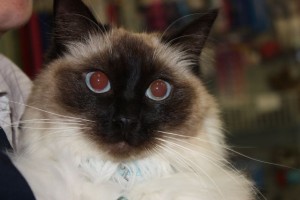Hyperthyroidism is a common disorder of older cats. An ov eractive thyroid gland produces and secretes too much thyroid hormone putting pressure on all body organs. Any sex or breed of cat can be affected.
eractive thyroid gland produces and secretes too much thyroid hormone putting pressure on all body organs. Any sex or breed of cat can be affected.
The signs of hyperthyroidism include:
- Weight loss
- Increased appetite
- Hyperactivity and restlessness
- Increased heart rate, associated with irregularities in rhythm, murmurs and high blood pressure
- Increased frequency of defecation with occasional accidents inside
- Increased thirst and urination
- Occasional vomiting
- Panting
- Matted, greasy and unkempt coat
- Enlarged thyroid glands on the neck
If we suspect that your cat has hyperthyroidism we send blood for measurement of the thyroid hormone, T4. We also check for secondary liver, heart or kidney problems.
We usually treat hyperthyroidism with tablets or drops and recommend radioactive iodine therapy once your cat’s system has settled down.
- 1. Anti-thyroid drug therapy
Anti-thyroid drugs interfere with the production and secretion of thyroid hormone. They control rather than cure the condition.
Carbimazole (brand name Neo Mercazole) tablets are given twice daily. We see mild and often transient side effects in a few cats on this medication. These include poor appetite, vomiting and lethargy. More serious side effects including a fall in the white blood cell count, clotting problems, or liver disorders occasionally result. If we find any serious side effects after 2 weeks of medication we switch to another treatment.
Many owners prefer methimazole as a gel applied to the inside of the ear or made up into a palatable liquid.
Hyperthyroidism often covers up kidney troubles in cats. If your cat seems to be drinking or urinating a lot more on medication then alert us as soon as possible.
- 2. Radioactive iodine therapy
If kidney problems are not uncovered by anti-thyroid therapy then we suggest radioactive iodine, a more permanent cure for hyperthyroidism. Radioactive iodine only destroys the affected thyroid tissue and leaves adjacent normal tissue, including the parathyroid glands, untouched.
We refer you to a special facility at Canberra Veterinary Hospital for radioactive iodine therapy. Treated cats are kept in hospital for a week after the treatment until they are no longer a radiation risk to people.
Radioactive iodine treatment is curative and has no serious side-effects. Depending on the age of the cat at diagnosis the cost of treatment is similar to long term anti-thyroid drugs or surgery.
It is the only effective treatment for thyroid adenocarcinoma, the cancer that causes 1 to 2% of feline hyperthyroid cases.
- 3. Surgical thyroidectomy
Removal of the thyroid glands provides an immediate cure but has some nasty potential side effects so we don’t often recommend it.
